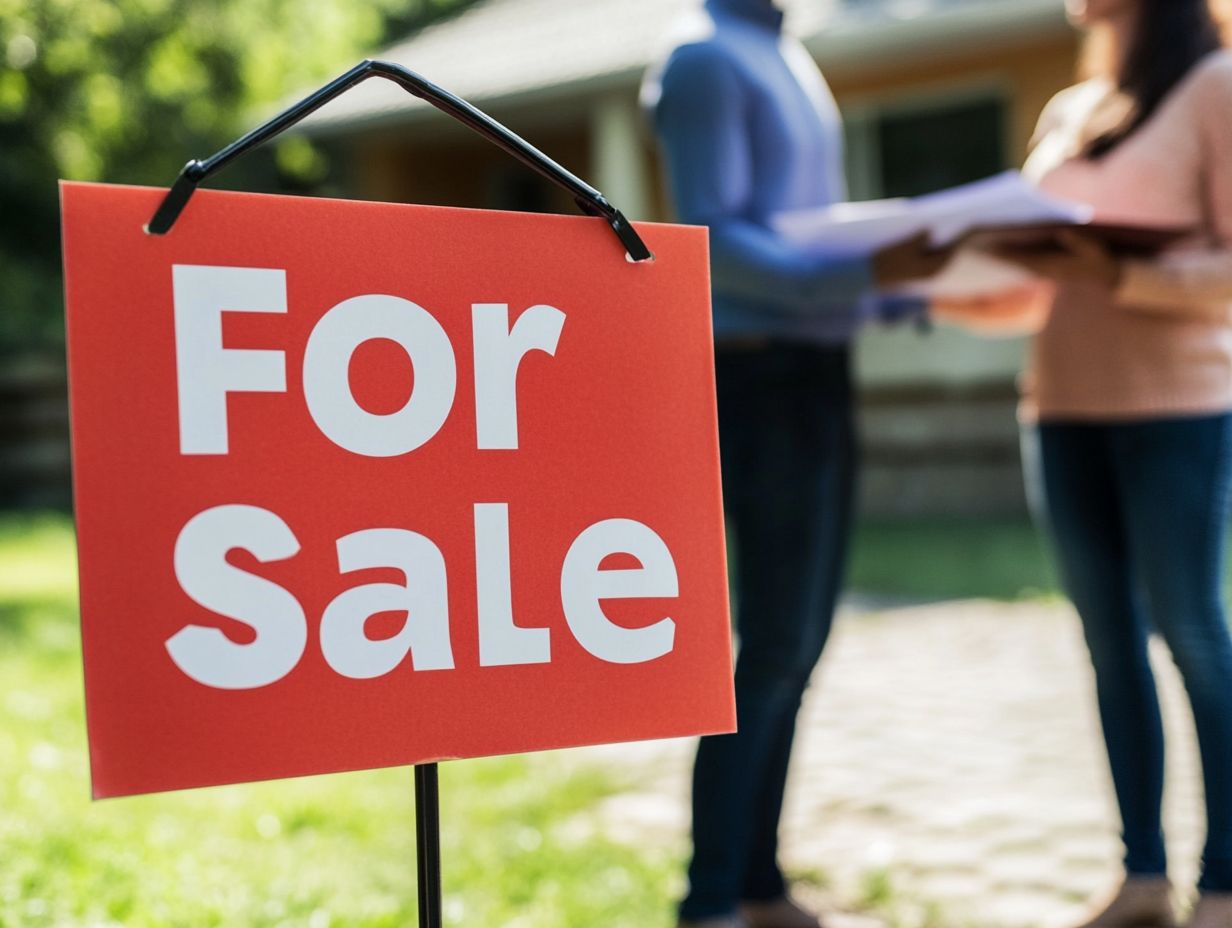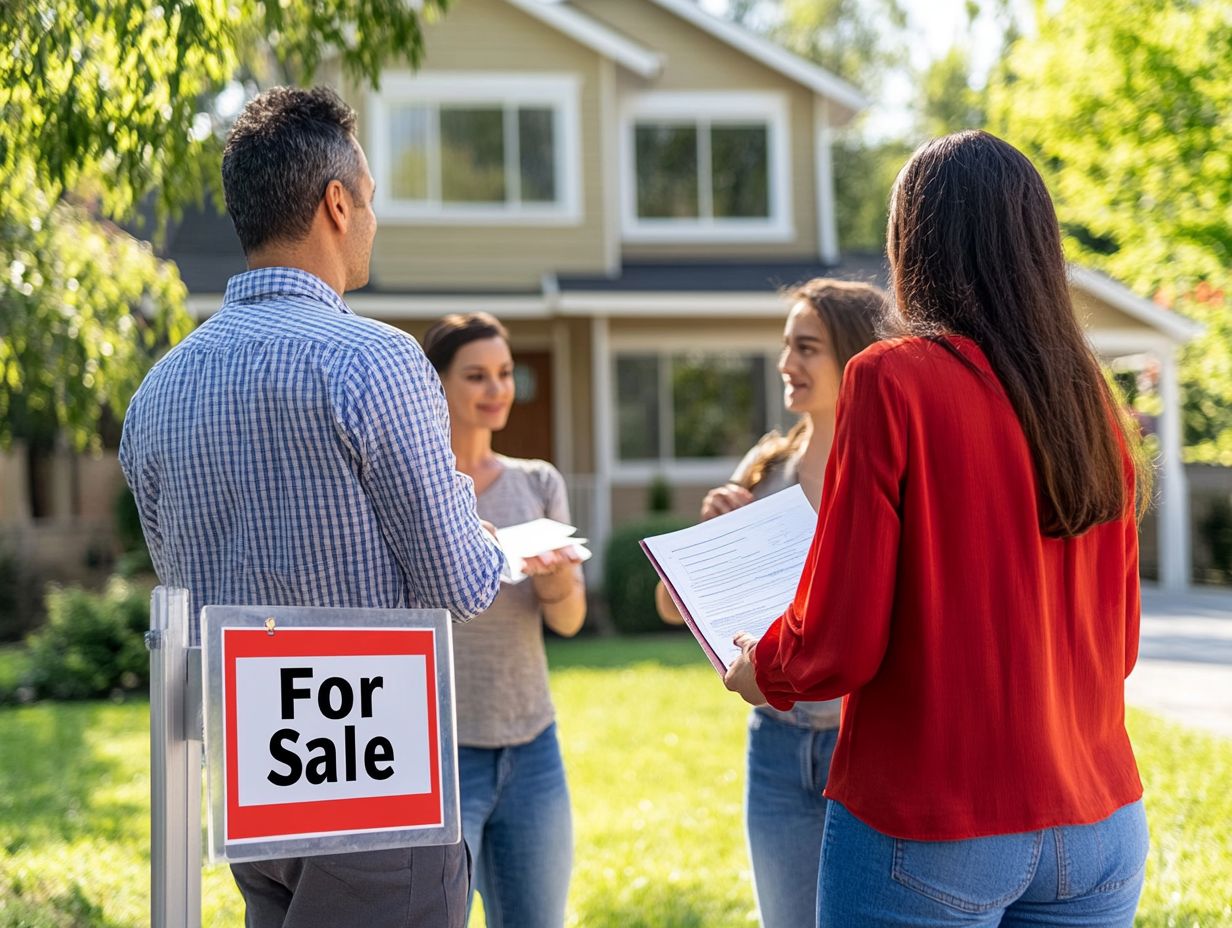Understanding the Home Selling Process
Selling your home might seem daunting, but it doesn t have to be. With the right approach, you can elevate your home’s appeal and facilitate a seamless transaction.
This guide is your roadmap to a successful home sale! From evaluating your home’s value to addressing necessary repairs and selecting the ideal real estate agent, each step is vital for maximizing your sale. You’ll discover valuable insights to help you navigate this journey with confidence.
Contents
Key Takeaways – Essential Tips for Selling Your Home:

Having a realistic understanding of your home’s value is crucial for a successful sale. Don’t miss out on the chance to maximize your sale and attract eager buyers!
Assess and make necessary repairs to ensure your home is marketable. Working with a real estate agent can provide valuable expertise and resources when selling your home. Choose an agent who best fits your needs and goals.
Effective marketing is key to attracting potential buyers. Creating a well-crafted listing and utilizing different marketing channels can help increase visibility and interest in your home.
Preparing to Sell Your Home
Preparing to sell your home demands a thorough grasp of the real estate market and an accurate evaluation of your property s worth. This includes addressing necessary repairs and determining the optimal price according to current market trends.
Essential steps include assessing your home and collaborating with a professional agent. They can provide insights into buyer preferences and local market dynamics. Ultimately, meticulous preparation lays the groundwork for a successful sale in the competitive housing market of 2024.
Assessing Your Home’s Value
Assessing your home’s value is a pivotal first step in the selling process. This often involves conducting a thorough comparison of similar homes to help set a competitive price that will lure buyers.
You might consider hiring a professional appraiser for an impartial evaluation. They analyze comparable properties in your area, taking various factors into account, such as square footage, condition, and unique features that make your home stand out.
Keeping an eye on current market trends reveals insights into buyer demand and pricing shifts, enabling you to make informed decisions. Real estate agents can be invaluable allies, using their expertise to recommend suitable listing prices based on in-depth market research.
Understanding local market conditions is essential as these factors can significantly impact your property s value and the overall selling experience. Renovations or upgrades can greatly enhance your home s appeal and worth, so consider these elements before putting your property on the market.
Making Necessary Repairs and Improvements
Making necessary repairs and improvements to your home can dramatically enhance its appeal and value. This can attract more buyers and potentially increase your sale price.
Investing in key areas like kitchens and bathrooms often yields substantial returns. Updating fixtures, cabinets, and countertops can give a modern touch that resonates with current market trends.
Enhancing curb appeal through thoughtful landscaping and a fresh coat of paint creates a welcoming first impression that buyers can t resist. Ensuring your property meets essential home inspection standards think functional plumbing and safe electrical systems can pave the way for a seamless sale.
By prioritizing repairs based on buyer preferences and popular market demands, you ll effectively boost your home s overall value and desirability.
Finding a Real Estate Agent
Finding a qualified real estate agent is crucial for navigating the complexities of the selling process. These professionals bring invaluable insights into the local market and can skillfully guide you through negotiations to secure the best possible deal.
Engaging an experienced agent can greatly influence your timeline, pricing strategy, and overall success when selling your home. They will assist you in effectively marketing your listings, managing buyer inquiries, and ensuring that all necessary documents are carefully prepared for the sale.
Ultimately, selecting a reputable agent not only helps you avoid potential pitfalls but also streamlines the transaction, making your selling experience significantly more efficient.
Benefits of Working with an Agent

Working with a real estate agent brings a wealth of benefits, including specialized market expertise, effective marketing strategies, and skilled negotiation tactics that can truly elevate your selling experience.
These professionals possess an in-depth understanding of local market trends, allowing them to price your property competitively and attract serious buyers. For instance, they can create compelling property listings that showcase unique features, helping your home shine in a crowded market.
Savvy agents use staging techniques that can boost a property’s perceived value, potentially leading to sales prices up to 20% higher than unstaged homes, according to industry studies.
With access to a tool that helps agents list properties so more buyers can see them, real estate agents ensure your property reaches a broader audience, significantly increasing the chances of a timely sale.
Questions to Ask When Choosing an Agent
When selecting a real estate agent, it’s crucial for you to ask the right questions to ensure they align with your selling goals and possess the local expertise necessary to navigate the current market effectively.
This process not only lays a solid foundation for your relationship but also reveals the agent’s grasp of the nuances that define your neighborhood’s real estate landscape.
You might start by inquiring about their years of experience in the field and how long they ve specifically operated in your local market. Discussing their approach to commission rates can provide valuable insight into their pricing structure and how it stacks up against others in the area.
It’s equally important to understand their marketing strategies, as these will directly impact your property’s visibility. Above all, prioritize transparency and consistent communication throughout this partnership; these elements are essential for cultivating a more successful selling experience.
Marketing Your Home
Effective marketing is key to selling your home fast and for the best price! It showcases your property and draws buyers in through captivating online listings, stunning high-quality photos, and immersive staging techniques.
Creating an Effective Listing
Creating a standout listing is crucial to winning buyers attention! It showcases your home’s unique features and captivates potential buyers with compelling descriptions and high-quality images.
Alongside well-crafted text and stunning visuals, grasping the nuances of the local real estate market is essential. Potential buyers value accurate descriptions that provide relevant insights into the property’s layout, amenities, and neighborhood highlights, allowing them to envision what awaits them.
Engaging visuals, like virtual tours or drone footage, can elevate your listing, making it more enticing and shareable. Leveraging the Multiple Listing Service (MLS) expands your reach, ensuring that your property catches the eyes of a broader audience.
To truly stand out, it’s crucial to highlight not only the home’s best features like abundant natural light and spaciousness but also to weave a narrative that resonates with potential buyers, inviting them to picture their future in that space.
Utilizing Different Marketing Channels
Utilizing various marketing channels is essential for maximizing your home’s exposure to potential buyers. A multi-faceted approach can significantly enhance your chances of achieving a successful sale.
From online listings that cast a wide net to targeted social media campaigns that generate buzz, each channel offers unique advantages. Online listings, for instance, showcase detailed descriptions and high-quality images that captivate interest.
Social media platforms foster interactive engagement, helping potential buyers envision their future in your home. Real estate agents play a pivotal role in this landscape, expertly promoting listings across these channels and leveraging their extensive networks.
They craft compelling narratives that highlight your home s key features and promote open houses, effectively driving foot traffic and interest in your property.
Negotiating and Closing the Sale

Negotiating and closing the sale of your home requires attention to detail in evaluating offers, skillful communication with potential buyers, and adept management of the timeline. This ensures a seamless transition as you approach the closing table.
Understanding the Process and Timeline
Understanding the process and timeline of selling your home is crucial for managing your expectations and ensuring a successful transaction, including what are the steps to selling a home, from the moment you receive that initial offer to the final closing date.
Your journey typically begins with a thorough market assessment and preparing your property to enhance its appeal to potential buyers. Once you list your home, you can generally expect to receive offers within a few weeks.
This stage often leads to negotiations, which may involve counteroffers or adjustments in pricing. Throughout this process, having a clear grasp of the various milestones like inspections and appraisals can be incredibly advantageous.
It enables you to address any concerns proactively and keeps communication with your real estate agent streamlined. Ultimately, this approach paves the way for a smoother transition as the closing date approaches.
Tips for Successful Negotiations
Successful negotiations are pivotal for achieving your desired outcome when selling your home. Employing effective strategies will enable you to navigate offers and counteroffers with poise.
To maximize these negotiations, it s crucial to establish clear expectations from the outset not just regarding the price, but also concerning the terms of sale.
Embracing a spirit of compromise can foster positive relationships with potential buyers, as flexibility often paves the way for mutually beneficial agreements.
Having a firm grasp of the current market value of comparable properties is essential during discussions. This knowledge allows you to confidently justify your asking price.
Be prepared for potential challenges, such as closing costs or other issues that may arise during negotiations. Being ready for these eventualities will ensure smoother transactions and strengthen your negotiating position.
Completing the Closing Process
Completing the closing process is the exciting final step in your home-selling journey! This phase demands meticulous attention to detail and careful organization of essential documents to ensure a successful transaction.
During this critical phase, enlisting the help of a real estate attorney can be invaluable. They guide you through complex legalities and ensure compliance with local regulations, making the journey smoother.
Understanding and managing closing costs is equally vital. These expenses covering title insurance, appraisal fees, and attorney fees must be clearly outlined and anticipated in advance to avoid last-minute surprises.
As you gather all necessary documentation, be prepared for potential challenges, such as title issues or discrepancies in the property appraisal. Proactive communication with all parties involved, including lenders and buyers, is essential to tackle these hurdles effectively.
This collaboration facilitates a smoother closing process and paves the way for the successful conclusion of your sale.
Frequently Asked Questions
What is the Home Selling Process?

The home selling process refers to the series of steps that a homeowner must take in order to successfully sell their property. This typically involves preparing the home for sale, finding a real estate agent, marketing the home, negotiating offers, and understanding the process of home inspections before completing the closing process.
What are the Key Steps in the Home Selling Process?
The key steps in the home selling process include preparing the home for sale.
Next, set a competitive price, market the property, and show the home to potential buyers.
Receive and negotiate offers, complete the necessary paperwork, and close the sale.
How Long Does the Home Selling Process Take?
The length of the home selling process can vary. It depends on factors such as the local real estate market, the condition and location of the property, and the seller’s motivation.
On average, the process can take anywhere from 2 to 6 months.
Do I Need a Real Estate Agent to Sell My Home?
You can sell your home without a real estate agent, but it’s better to have a professional’s help. A real estate agent provides valuable expertise, market knowledge, and negotiation skills to help you sell quickly and get the best price.
How Do I Determine the Right Price for My Home?
Finding the right price for your home is essential! Start with a market comparison of similar homes in your area.
Consider the condition and features of your home, and consult with a real estate agent for their professional opinion.
What Costs Should I Expect During the Home Selling Process?
Budget for selling costs now! There are several costs involved, including the real estate agent’s commission, closing costs, and any necessary repairs or upgrades to prepare the home for sale.
Discuss these costs with your agent before you list your home.
Ready to sell your home? Connect with a local real estate expert today!






